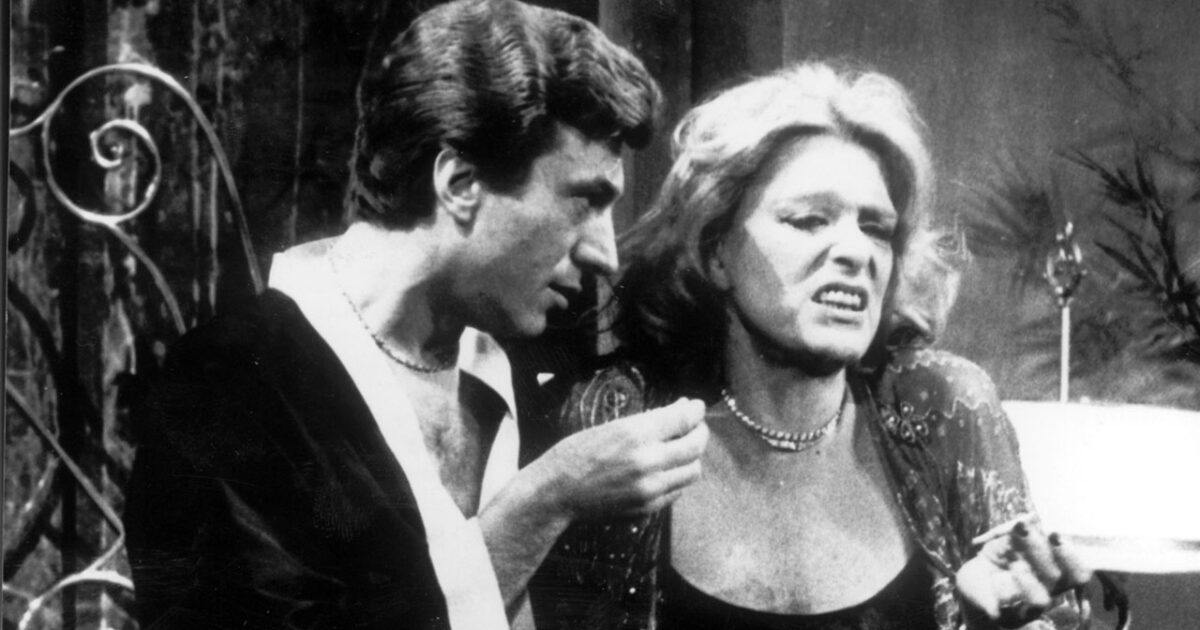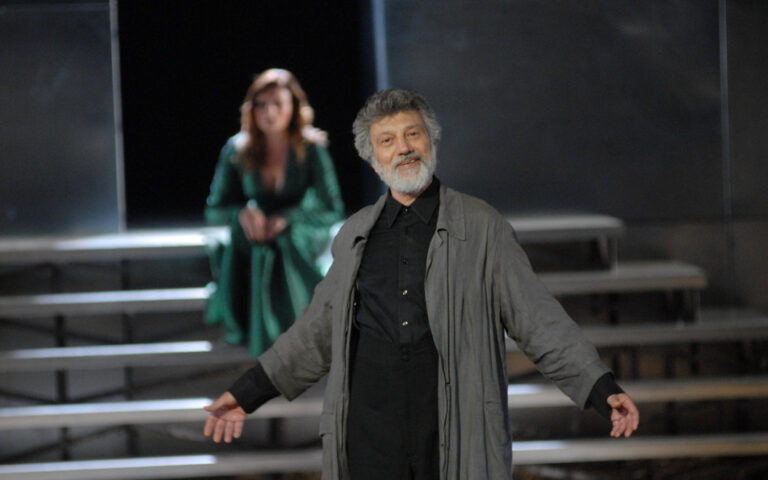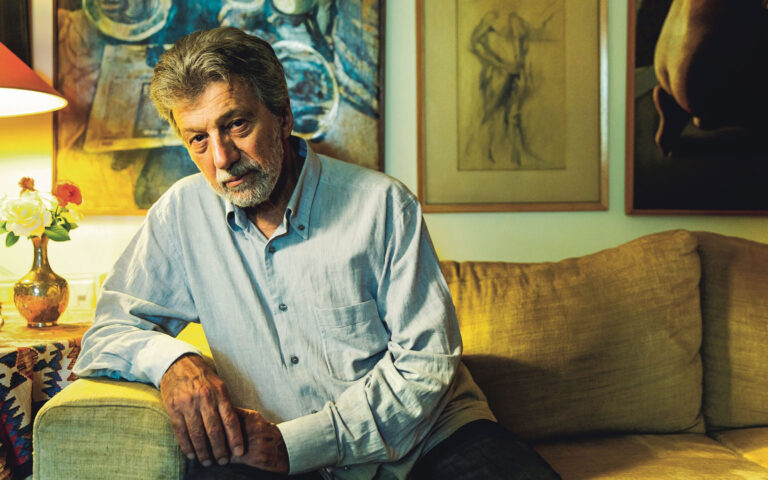
He was more than handsome, he was charming. Naturally likable. He had the most beautiful male voice in Greek theatre, without a trace of arrogance or boasting. On the contrary, his voice maintained the gentleness and integrity of his personality.
No one should be surprised that a humble man like Mr Giannis VertesWho passed away at the age of 86, was never satisfied with his artistic achievements. He had difficulty speaking about himself, and he didn't even feel like he had any special talent.
We have conducted three interviews since the mid-1980s, the last one ten years ago. The most humane was the one in 2014 on the occasion of Aeschylus's “Persians” to be presented at Epidaurus. He was 76, and more talkative than ever, relaxing in his bright living room, sheltered from the cat fight he had with his wife, Marina Psaltis.

As I listen to the recording of the interview – as I was unable to publish it in full – I feel his anger at what was shaking the country at that time. He did not like to talk about politics, but it was the arrogance of authority and unemployment among the youth, which he and his nephew experienced, that explained his discontent. “One more, one less, we are responsible. We have all witnessed some incidents in urban planning or tax authorities. It is not just a matter of crisis.” He was also disturbed by the widespread ugliness. “You can't even drive on the streets because of the smudged signs.”
He was disturbed by the violence and daily routine of Golden Dawn. “It is through violence that they feel that they are.” He was outraged by the constant killings and reckless use of weapons in America, and then recounted an incident that deeply affected him. “One time I took my father and two of his brothers hunting in the village. They didn't hit anything, I left them in a café, got bored, and went for a walk holding my father's gun. Until I saw a squirrel, I pulled one out and got it. I didn't even understand what I was doing. I got “A lot of sadness. I still remember that. This is what it means to carry a gun.”
As if he had brought everything together that afternoon, he pointed out the country's adventures, everyone's responsibilities and ours. “In the villages they left the crops, got a second car, spent on bouzouki and let the migrants work. I don’t excuse the politicians, but I can’t blame them for everything.”
He was proud of the owners of the house, who came from their village, five brothers, who worked as clerks and then opened their own butcher shop. “They never got a loan,” and neither did he. The house in which he lived, although he had worked for many years, was bought there when he was nearly sixty years old. For him there was nothing at all: “I didn't fight for a better world, I just wished it would come. I didn't resist the junta. I don't think I offer anything to people through art. I enjoy theater, because that's what I dreamed of since I was a child.” “. He also disarmed the rest: “I don't feel like I have anything to offer the culture. Maybe others can.”
He finished night school because he worked in the morning at Varvakeio Agora. When he was sent to make the perfect presentation, “I would throw a leg of veal over my shoulder and on the way I would stop at the Art Theater gallery and admire the pictures.”
His paternal roots were in Lycabettus, but he loved his native land, Daphne. “It is the last village of Fthiotida before Fokida. I spent the summer there among the fir trees. Often, when I listened to the vernacular, I found myself playing the clarinet.”
At the age of 14, his adolescence was marked when his older brother took him to “Kotopolis”, where he saw Anna Sinodino and Dino Eliopoulos. In the following years, “I would go to bed at night and think about theater for hours. What I felt as a spectator when I was 18, I did not feel as an actor.”
He was laughing at the youthful impulse that had led him in the middle of the day to Lycabettus to read Hamlet among the pine trees. His mother wanted to see him at university, he dreamed of theater. “To blackmail her, I told her either I will become an actress or I will work in a butcher shop.” He finished night school because he worked in the morning at Varvakeio Agora. When he was sent to make the perfect presentation, “I would throw a leg of veal over my shoulder and on the way I would stop at the Art Theater gallery and admire the pictures.”
He joined the universe and at the age of 21, in 1959, he starred in the film “The Night Afternoon” directed by Iakovos Campanellis. Since then, it has been loved by many generations. “It worked,” he replied awkwardly. “The Beautiful Bird of Youth” was the third play he presented. They say that Melina then wanted Papamichael. “He wasn't wrong, I was young. When we did the play again in the 1980s, the performance was much healthier.”

Later, the theater made him a lot of money when he and Xenia Kalogeropoulou were hosts and co-producers. They showed works by Wilde, Pirandello, Gogol, Kohut, and Brecht, and she “was acting in films and making the money she threw at the theater and I wasn't feeling well. So I said 'yes' to cinema. In one winter I shot three Milo films. I even read the script and I worked like a professional.”
He loved so much and was loved even more. His first marriage was to Xenia Kalogeropoulou, then to Mimi Denisi, and between them he fell in love with Tania Tsanaklidou and married the woman of his life, Marina Basalti, with whom they were together from 2001 until the end. When I was young, I often neglected my work, I loved crazy things and late nights. When we were preparing “Sweet Bird of Youth” for testing, I went after a poca all night with friends. And in training, Kuhn kept correcting me.” Satisfied with the success, the acceptance, the evenings, the trips, the walks in the countryside I loved, a little (but not too much) with good friends, like Stamatis Phaseoulis and Diagoras Chronopoulos, and of course the stadium. “Panathinaikos, of course.” Maybe I didn't read his team, he pointed out to me.
In 2014, time had a different meaning. When he grew up he had a little difficulty learning. Sometimes he felt guilty, “Because I might put my colleagues off, but in the end I do.” At their house, Marina cooked well, and they were interested in other things besides the theater, like their families, their nieces, who they would invite, what they would eat… She wanted to “leave” quietly. “Like my father who died at the age of 97 in his sleep. I prepare for everything…”

. “Certified social media geek. Passionate webaholic. Unapologetic music specialist. Food ninja.”





More Stories
Monica Bellucci and Tim Burton are more in love than ever at the Venice Film Festival – melting for each other
It hurt me as much as it hurt us all.
Marios Athanasiou Shocked: ‘Tighter Penalties for Rape and…’ | Celebrity News